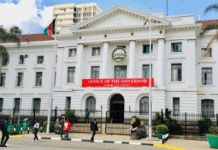Written by Were Kelly
Nairobi County’s Chief Officer for Environment, Geoffrey Mosiria, was hospitalised after collapsing upon learning he faces a potential jail term for contempt of court, leading to a postponement of his sentencing until next year. The incident on Tuesday, November 4, 2025, has delayed a high-profile case centred on allegations that Mosiria defied a judicial order restraining the county government from approving building developments in the Parklands residential area. His legal team successfully argued for an adjournment, citing his health and introducing new claims of forged documentation that are now under investigation by the Directorate of Criminal Investigations.
The contempt case stems from a conservatory order issued by Environment and Land Court Judge Anne Omollo on March 5, 2025. The order explicitly barred Nairobi County and its committees from processing or approving any development applications in Parklands pending the creation and implementation of a proper physical and land use plan.
The ruling was a victory for Parklands residents, who have long petitioned against uncontrolled high-rise constructions they blame for chronic traffic congestion, increased flooding, and the destruction of heritage sites. Despite this order, the prosecution successfully argued that Mosiria, in his official capacity, continued to approve or facilitate development permits, leading to his conviction for contempt.
Following the conviction, the court was set to deliver its sentence on November 4. However, the proceeding was thrown into disarray when Mosiria’s lawyers informed the court that he had collapsed after being informed of the likelihood of a custodial sentence and was subsequently admitted to hospital. In their submissions, the defence team challenged the basis of the ruling, asserting that their client was unaware of the order’s specific implications.
They further introduced a potentially significant complication to the case by alleging that signatures on key case documents had been forged, a claim serious enough to prompt a referral to the DCI. In light of these developments, the court postponed the sentencing to February 2026, and Judge Omollo has referred the matter to Chief Justice Martha Koome for the potential appointment of a three-judge bench to review the complex case.
The incident and the allegations against Mosiria have ignited vigorous discussion on social media, reflecting broader public sentiment towards city officials. On platform X, one user, @_Briankorir, captured a common criticism, writing, “This idiot has terrorized nightclubs while ignoring churches—lock him up!” This comment alludes to Mosiria’s enforcement of the Public Nuisance Act, 2021, against entertainment venues, which some have previously alleged was selective and motivated by bribery.
The public reaction underscores a deep-seated frustration with perceived corruption and inconsistent application of regulations within Nairobi County governance. For the residents of Parklands, the delay represents a continued anxiety over the protection of their neighbourhood. As one representative noted, “We’ve fought for years to protect our estate, and this delay only emboldens county officials to flout the law.”
With the sentencing now delayed until February 2026, the focus shifts to the DCI’s investigation into the forgery claims and the assembly of a three-judge bench. The outcome will not only determine Geoffrey Mosiria’s future but also set a significant precedent for accountability and the rule of law in Nairobi’s often contentious urban development landscape. The case continues to highlight the critical tension between rapid urban development and the legal and regulatory frameworks designed to manage it sustainably.



















